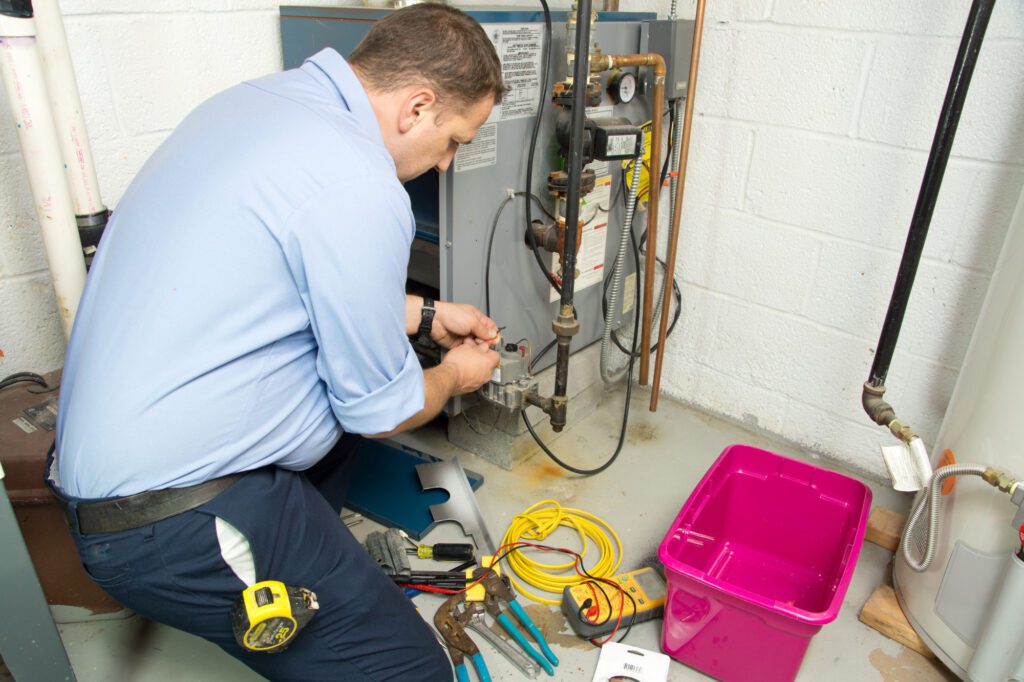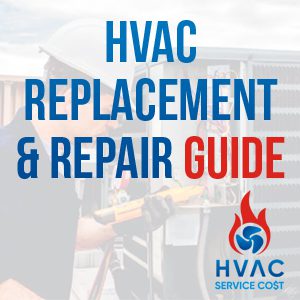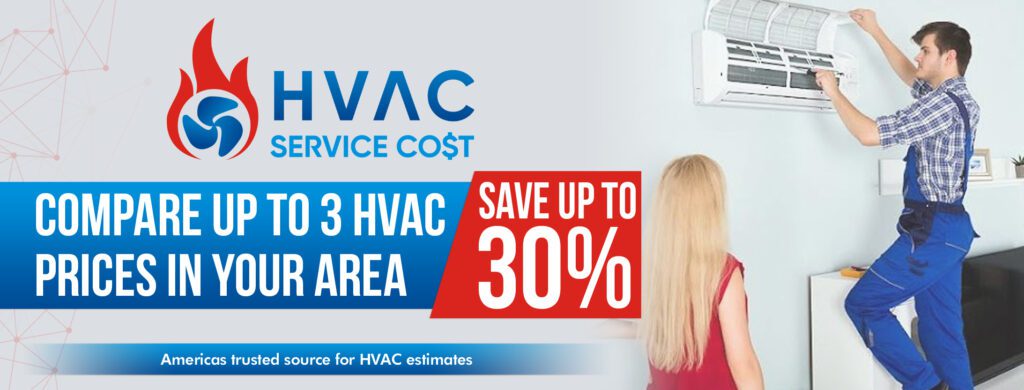
Understanding What HVAC Services You Need and When
Navigating the world of Heating, Ventilation, and Air Conditioning (HVAC) can sometimes feel daunting, especially if you’re not well-versed in the intricacies of these systems. Yet, it’s crucial to understand their nuances, given the pivotal role HVAC systems play in maintaining the comfort and safety of our homes and offices. This blog will help you decipher the types of HVAC services you might need and guide you on the best times to seek them.
COMPARE QUOTES NOW1. Regular Maintenance
Why You Need It: Just as a car requires periodic tune-ups, your HVAC system needs regular checks to function optimally. Regular maintenance ensures your system runs efficiently, extends its lifespan, and can prevent costly breakdowns.
When to Seek It: Ideally, you should have your HVAC system checked and serviced twice a year: once in the spring for the cooling system and once in the fall for the heating system.
2. System Repairs
Why You Need It: Wear and tear, parts reaching their lifespan, or unexpected mishaps can lead to HVAC malfunctions. Prompt HVAC repairs can prevent minor issues from escalating into major problems.
When to Seek It: If you notice unusual noises, reduced efficiency, inconsistent temperatures, or any sudden spike in your energy bills, it might be time to call in the professionals.
3. System Replacement
Why You Need It: Like all machinery, HVAC systems have a finite lifespan. Over time, they can become less efficient or may break down frequently, leading to increased repair costs.
When to Seek It: Most HVAC systems last between 15-20 years, depending on the brand, usage, and maintenance. If your system is within this age range and encountering frequent issues, it’s wise to consider an HVAC replacement.
4. Air Quality Assessment
Why You Need It: HVAC systems don’t just regulate temperature; they also influence indoor air quality. Over time, dust, mold, and pollutants can accumulate, affecting the air you breathe.
When to Seek It: If allergy symptoms increase, or you notice a persistent musty or stale smell, it may be time to check your air quality. This assessment should ideally be done annually.
5. Duct Cleaning and Sealing
Why You Need It: Ducts are the conduits that distribute warm or cool air throughout your premises. Clean ducts improve efficiency and air quality, while sealing any leaks ensures optimal performance.
When to Seek It: Every 3-5 years is a general guideline for duct cleaning. However, if you’ve recently renovated, have pets that shed heavily, or notice excessive dust, you might need to do it sooner.

6. Thermostat Upgrades
Why You Need It: Modern thermostats offer advanced features like programmability and smart home integration, allowing more efficient energy use and enhanced comfort.
When to Seek It: If you’re still using a manual thermostat or one that’s more than a decade old, consider upgrading to a newer model.
7. Emergency Services
Why You Need It: Sudden breakdowns can occur, especially in extreme temperatures, leading to discomfort and potential health risks.
When to Seek It: Whenever there’s a sudden system malfunction, especially during extreme weather conditions.
8. Energy Efficiency Audits
Why You Need It: This service assesses how energy-efficient your HVAC system is. By identifying areas of improvement, you can optimize the system and reduce energy bills.
When to Seek It: If you’ve never had an audit or if it’s been several years, it’s a good idea to have one done. Also, consider this if you notice a steady increase in energy costs.
Understanding your HVAC system’s needs ensures you stay ahead of potential problems, ensuring consistent comfort and safety. Regular check-ups, timely interventions, and upgrades when necessary can make all the difference in longevity, efficiency, and the overall health of your HVAC system. Armed with this knowledge, you can make informed decisions and enjoy the peace of mind that comes with a well-maintained HVAC system.
COMPARE QUOTES NOWUnderstanding the Costs of Routine HVAC Services
When considering the maintenance and care of your HVAC system, it’s essential to have a general idea of the costs involved. The prices can vary based on your location, the specific issue at hand, the age of your system, and the company you choose. However, we’ll provide you with a general overview of average costs for typical HVAC services to help you budget accordingly.
1. Regular Maintenance
A routine inspection and maintenance service can include checking refrigerant levels, inspecting electrical connections, and cleaning essential components.
Average Cost: Generally, homeowners can expect to pay between $100 to $150 for a standard maintenance visit. Some companies offer annual contracts or memberships that can reduce the per-visit cost.
2. System Repairs
The cost of repairs can significantly vary based on the specific component that needs fixing.
Average Cost: Minor repairs, like fixing a broken thermostat, might range from $50 to $200. More extensive repairs, such as replacing a compressor, can range from $500 to $1,000 or more.
3. System Replacement
Replacing an old HVAC system with a new one can be a substantial investment.
Average Cost: Central air conditioners might cost between $2,500 and $7,500, while furnace replacement can range from $2,000 to $5,000. Remember, high-efficiency models might have a higher upfront cost but can save money in the long run due to reduced energy bills.

4. Air Quality Assessment
Professional air quality tests can provide insights into potential pollutants or allergens in your home.
Average Cost: Homeowners can expect to pay between $300 to $500 for a comprehensive air quality assessment.
COMPARE QUOTES NOW5. Duct Cleaning and Sealing
Keeping your ducts clean ensures better air quality and system efficiency.
Average Cost: Duct cleaning services generally range from $300 to $500 for a typical home. Duct sealing, which can reduce air loss, may cost between $250 to $1,000, depending on the extent of the sealing required.
6. Thermostat Upgrades
Modern thermostats, especially smart models, can offer better temperature control and energy savings.
Average Cost: Basic programmable thermostats can start as low as $50, while advanced smart thermostats might range from $150 to $300, excluding installation fees.
7. Emergency Services
Urgent HVAC services outside of regular business hours can have higher costs due to their immediate nature.
Average Cost: The cost for emergency services can be about 50% to 100% higher than standard rates, depending on the nature and complexity of the issue.
8. Energy Efficiency Audits
A professional audit can pinpoint areas where your home loses energy, including inefficiencies in your HVAC system.
Average Cost: Energy audits typically cost between $300 to $500, although some local utilities might offer discounts or rebates to incentivize homeowners.
While these are average costs, it’s essential to get several quotes from different service providers in your area to understand the local market better. Regular maintenance can prevent more significant, costlier issues down the road, making it a wise investment in the longevity and efficiency of your HVAC system. Always prioritize professional, reputable services to ensure that your HVAC system receives the best care.
COMPARE QUOTES NOWThe Long-Term Savings of Regular HVAC Services
The old saying, “A stitch in time saves nine,” rings particularly true for HVAC systems. Keeping up with regular HVAC services might seem like an added expense, but it’s an investment that can lead to substantial savings in the long run. Let’s explore how diligent HVAC upkeep can be financially beneficial.
Preventative Maintenance Reduces Repair Costs
Regularly scheduled maintenance can identify potential issues before they become significant problems. By addressing small concerns early, you can prevent more extensive, and consequently, more expensive repairs in the future. When minor issues go unchecked, they can escalate, leading to major malfunctions that can be costly to rectify.
Improved Efficiency Lowers Energy Bills
A well-maintained HVAC system operates at its highest efficiency. When components are clean and in good working order, the system doesn’t have to work as hard to maintain desired temperatures. This optimal operation translates to lower energy consumption and reduced monthly utility bills. Over time, these savings can be considerable.
Extended Equipment Lifespan
Regularly servicing your HVAC system ensures that it runs under optimal conditions. This care not only ensures efficient operation but also extends the life of the equipment. By prolonging the lifespan of your HVAC system, you delay the need for a costly replacement, spreading out the significant investment over a more extended period.

Avoiding Emergency Call-Out Fees
Emergency breakdowns can happen at the most inopportune times, often requiring urgent professional intervention. These emergency services can come with hefty call-out fees, especially during off-hours or holidays. Regular maintenance decreases the likelihood of unexpected breakdowns, helping you avoid these unplanned expenses.
Maximizing the Benefits of Warranty
Many HVAC systems come with warranties that cover specific parts or labor for a certain period. Regular maintenance keeps these warranties valid. If an issue arises during the warranty period, the costs might be significantly reduced or even entirely covered by the manufacturer. Neglecting regular service might void these warranties, leading to out-of-pocket expenses that could have been avoided.
Reducing the Need for System Upgrades
A well-maintained system that meets the heating and cooling needs of your home reduces the urge to upgrade prematurely. By keeping your current system in top shape, you can delay the need for an upgrade, allowing you to benefit from advancements in technology and potentially lower prices in the future.
Enhancing Air Quality Reduces Health-Related Expenses
Regular HVAC maintenance includes cleaning and replacing air filters and ensuring the ductwork is free of pollutants. This care results in improved indoor air quality, which can have health benefits. By reducing allergens and pollutants, you may experience fewer respiratory issues or allergic reactions, potentially saving on medical bills and medications.
COMPARE QUOTES NOWAn ounce of prevention is worth a pound of cure. Investing in regular HVAC services can lead to considerable long-term savings. Beyond the financial benefits, a well-maintained system provides peace of mind, knowing that you’re safeguarding your home’s comfort and the well-being of its occupants.
HVAC Problems to Look Out For and Their Common Solutions
Even with the best maintenance practices, HVAC systems can present issues from time to time. Recognizing these early can save both money and prevent bigger problems down the road. Let’s delve into some common HVAC problems and their typical solutions.
1. Inconsistent Room Temperatures
Problem: Some rooms might feel too cold or too warm compared to others.
Solution: This could be due to blocked vents or ducts, or an unbalanced system. Clear any obstructions from vents, and consider having a professional balance your system. Sometimes, a zone-based system might be needed for larger homes to ensure even temperature distribution.
2. Strange Noises
Problem: Rattling, buzzing, or humming noises coming from the HVAC unit.
Solution: While some sounds are part of the normal operation, unusual or loud noises can indicate loose parts or mechanical issues. It’s often best to have a technician inspect the system to pinpoint the cause and recommend a solution.
3. Reduced Airflow
Problem: The HVAC system is on, but the airflow from vents feels weak or nonexistent.
Solution: This can often be attributed to clogged air filters. Regularly replacing or cleaning air filters can restore airflow. If the problem persists, it could be due to a malfunctioning blower or blocked ducts.
4. Unpleasant Odors
Problem: Musty, burning, or other odd smells when the system is running.
Solution: Musty smells can indicate mold or mildew buildup, which requires cleaning and potentially treating the source of moisture. A burning smell might be due to an electrical issue or dust burning off, which should be inspected by a professional.

5. The System Frequently Cycles On and Off
Problem: The HVAC system seems to be constantly starting and stopping.
Solution: Short cycling can be due to an oversized system, a clogged filter, or thermostat issues. Check the air filter first. If the problem continues, consulting with a technician about the system size and thermostat settings is recommended.
COMPARE QUOTES NOW6. Water Leaks
Problem: Pools of water around the HVAC unit or dripping from components.
Solution: This could be due to a clogged condensate drain line or a frozen evaporator coil. Clearing the drain line or checking for proper refrigerant levels can solve the problem. Inconsistent cooling coupled with leaks often indicates a refrigerant issue.
7. Thermostat Issues
Problem: The temperature in the room doesn’t match the thermostat setting.
Solution: The thermostat might be miscalibrated or malfunctioning. First, ensure it’s set to the correct mode (heating or cooling). If the issue persists, you might need to recalibrate the thermostat or consider a replacement.
8. Higher Energy Bills
Problem: A sudden spike in your energy bills without a significant change in usage.
Solution: This often indicates a drop in the system’s efficiency. Regular maintenance, checking for duct leaks, and ensuring the system operates optimally can help in restoring efficiency and reducing energy consumption.
Staying vigilant and recognizing these common issues early can lead to quicker resolutions, ensuring the prolonged health and efficiency of your HVAC system. While some solutions are straightforward and can be tackled by homeowners, others might require the expertise of a trained technician. Either way, timely action can prevent small problems from turning into costly repairs or replacements.

Understanding Your HVAC System and Its Service Needs
Your HVAC system is a complex assembly of various components working together to ensure a comfortable indoor environment. By understanding its key parts and their functions, homeowners can be better equipped to recognize when and what services might be required. Let’s break down the system and discuss typical service needs for each segment.
COMPARE QUOTES NOWThermostat
Understanding: This is the control center of your HVAC system. It detects the room’s temperature and signals the system to turn on or off based on your set preferences.
Service Needs: Calibration checks and, occasionally, replacement if the thermostat becomes faulty or outdated. Upgrades to smart thermostats can also improve efficiency and user experience.
Furnace
Understanding: The furnace heats the air that’s distributed throughout your home. It’s one of the primary components of an HVAC system.
Service Needs: Annual inspections to check for wear and tear, clean components, and ensure safe and efficient operation. Over time, parts like the heat exchanger might need replacement.
Air Conditioner
Understanding: Your AC unit cools the air and helps maintain a comfortable temperature during warmer months.
Service Needs: Regular maintenance includes cleaning or replacing filters, checking refrigerant levels, and inspecting the condenser and evaporator coils. Cleaning the coils and recharging the refrigerant are common services.
Ductwork
Understanding: Ducts transport the heated or cooled air from your furnace or air conditioner throughout your home.
Service Needs: Over time, ducts can accumulate dust, mold, and even pests. They may also develop leaks. Regular cleaning and sealing or insulating ducts can improve air quality and system efficiency.
Vents
Understanding: These are the outlets that deliver warm or cold air into each room and take in room air to be reconditioned.
Service Needs: Ensuring vents are unobstructed and cleaning them regularly can help maintain proper airflow and improve air quality.

Heat Pump
Understanding: For homes without furnaces, heat pumps serve dual purposes – they heat in the winter and cool in the summer.
Service Needs: Like air conditioners, heat pumps need regular maintenance, including checking refrigerant levels, inspecting and cleaning coils, and ensuring all components are functioning correctly.
COMPARE QUOTES NOWHumidifier/Dehumidifier
Understanding: These components control humidity levels in your home, either adding moisture to the air (humidifier) or removing it (dehumidifier).
Service Needs: Cleaning, replacing filters or pads, and ensuring water lines are clear and functional are typical service requirements.
Air Filter
Understanding: Positioned within the furnace or air handler, air filters trap dust, pollen, and other airborne particles, ensuring they don’t circulate throughout your home.
Service Needs: Depending on the filter type, homeowners should clean or replace them every 1-3 months, especially during peak usage seasons.
Recognizing the intricacies of your HVAC system is key to ensuring its longevity and optimal performance. By understanding each component and its associated service needs, homeowners can ensure a timely response to issues, leading to a more comfortable home environment and potentially saving on long-term repair costs. Remember, partnering with a reputable HVAC service provider can offer invaluable expertise and peace of mind.

The Benefits of Calling a Professional for HVAC Maintenance
While DIY has its place in the realm of home improvement, when it comes to HVAC maintenance, it’s wise to leave most tasks to the experts. There’s a myriad of reasons why calling in a professional can be more advantageous than attempting to tackle HVAC issues on your own. Let’s delve into the primary benefits of trusting a seasoned HVAC technician for your system’s care.
Expertise and Training
Professionals undergo rigorous training and stay updated with the latest advancements in HVAC technology. This expertise means they can diagnose and fix issues more accurately and quickly than someone without formal training.
Safety First
HVAC systems can be hazardous. They involve electrical components, refrigerants, and sometimes natural gas in heating systems. A misstep can lead to electric shocks, fires, or hazardous refrigerant leaks. Professionals have the necessary equipment and knowledge to perform tasks safely.
Comprehensive Maintenance
While homeowners might clean or replace filters, a professional will offer a comprehensive maintenance service. This includes inspecting coils, checking refrigerant levels, calibrating thermostats, inspecting wiring, and much more.
Extend Lifespan of Equipment
Regular professional maintenance helps in early detection and rectification of wear and tear, ensuring that your system runs smoothly for years. This can delay the need for costly replacements.
COMPARE QUOTES NOWWarranty Preservation
Many HVAC systems come with warranties that might become void if the system isn’t maintained or if repairs are not performed by a certified technician. Hiring a professional ensures your warranty remains intact.
Increased Efficiency
A system that’s regularly serviced by a professional will run at its peak efficiency. This translates to energy savings, which can considerably lower utility bills over time.
Cost-Effective in the Long Run
While there’s a cost associated with hiring a professional, it can be more cost-effective in the long run. They can prevent major malfunctions or system failures that would result in more significant expenses.
Peace of Mind
Knowing that a skilled professional has inspected and ensured the optimal performance of your HVAC system offers homeowners peace of mind. It’s reassuring to know that potential issues have been addressed, ensuring the system’s reliability.
Access to Advanced Tools and Equipment
Professional technicians come equipped with the latest tools and diagnostic equipment, allowing them to provide more effective and efficient service than most homeowners could achieve with basic tools.
Time Savings
HVAC maintenance can be time-consuming, especially for those unfamiliar with the intricacies of the system. A professional can get the job done in a fraction of the time, freeing homeowners to focus on other priorities.

An HVAC system is a significant investment in the comfort and safety of your home. While there might be minor maintenance tasks that homeowners can comfortably handle, entrusting the overall care of the system to a professional can offer numerous benefits. From ensuring optimal performance to increasing the equipment’s lifespan, professional intervention is a step toward safeguarding your investment and ensuring a comfortable living environment.
COMPARE QUOTES NOWTop 10 HVAC Companies in 2023
The HVAC industry is continually evolving, with companies introducing innovative solutions, cutting-edge technologies, and exceptional service standards to meet the diverse needs of homeowners. As we move through 2023, there are several standout HVAC companies that have made a mark in the industry. Here’s a closer look at the top 10 HVAC companies this year, known for their quality products, excellent customer service, and industry leadership.
1. Carrier Global Corporation
An industry stalwart, Carrier continues to be a global leader in high-technology heating, air-conditioning, and refrigeration solutions. Their energy-efficient products and global reach make them a go-to choice for many homeowners and commercial enterprises.
2. Trane Technologies
Trane has built a reputation on reliability. They offer a broad range of energy-efficient heating, ventilation, and air conditioning (HVAC) systems; dehumidifying and air cleaning products; and service and parts support.
3. Daikin Industries, Ltd.
Daikin is not just a global leader but also an innovator in the HVAC world. Their focus on environmentally-friendly products and dedication to technological innovation keeps them at the forefront of the industry.
4. Johnson Controls
With its extensive range of products and solutions, Johnson Controls is shaping the future of urban efficiencies. Their commitment to sustainability and innovation has made them a trusted name in the HVAC industry.
5. Lennox International
For those looking for a mix of efficiency and innovation, Lennox remains a top choice. Their range of furnaces, air conditioners, and other HVAC products are known for quality and durability.
6. LG Electronics
LG’s HVAC division is renowned for bringing innovation to the forefront. With their stylish designs and smart technology integrations, LG offers a unique blend of form and function in their HVAC products.

7. Mitsubishi Electric Corporation
A name synonymous with quality, Mitsubishi Electric provides state-of-the-art HVAC solutions suitable for both residential and commercial applications. Their ductless systems, in particular, have been a game-changer in the industry.
COMPARE QUOTES NOW8. Bosch Thermotechnology
A subsidiary of the Bosch Group, Bosch Thermotechnology specializes in high-quality, easy-to-use heating, cooling, and hot water solutions that are energy-efficient and environmentally friendly.
9. Honeywell International Inc.
Honeywell’s diverse range of HVAC products, combined with their emphasis on smart home integrations, make them a prominent player in the industry. Their thermostats, in particular, are highly regarded by homeowners.
10. Rheem Manufacturing Company
Rheem has been a trusted name in the HVAC world for years. Their range of heating, cooling, and water heating solutions are known for reliability, efficiency, and performance.
When considering an HVAC solution, whether for a residential or commercial space, it’s crucial to choose a company that guarantees quality, durability, and after-sales support. The above list of the top HVAC companies in 2023 offers a mix of longstanding industry giants and innovative newcomers, all of whom have made a mark by providing exceptional products and services. Making an informed decision based on your needs, budget, and the reputation of the company can ensure a comfortable and energy-efficient environment for years to come.
COMPARE QUOTES NOW


Leave a Reply